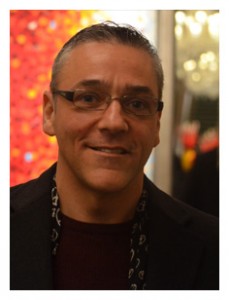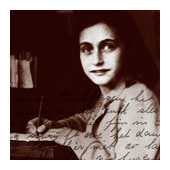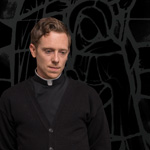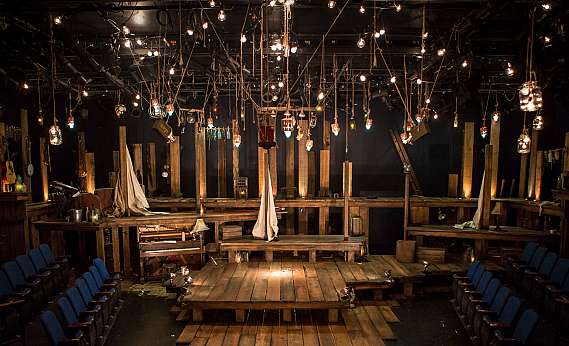 I am often asked about what goes into putting together a season for Writers Theatre; why we choose the plays we do and why this is a good time to produce them.
I am often asked about what goes into putting together a season for Writers Theatre; why we choose the plays we do and why this is a good time to produce them.
As we launch into a time of transition for the Theatre, we are presented with the opportunity to return to our roots at Books on Vernon and investigate once again the components that have helped create the mission and identity of Writers Theatre while simultaneously demonstrating no small degree of ambition in our preparations to inhabit our new building.
 Isaac’s Eye and playwright Lucas Hnath came to my attention when my agent suggested that we attend a performance on a recent trip to New York. The subject matter instantly intrigued me, as I have always been fascinated by questions of science and discovery. While science certainly plays a role in the play, I find myself much more drawn to the human elements of the drama—particularly the questions that arise around matters of ego and how far one might go in order to achieve the ultimate in fame and fortune. I found that to be an incredibly compelling theme for Writers Theatre at this time. Once removed from our humble settings and put into a grand new building, it becomes crucial that we hold fast to the foundations that have brought us to this confluence of circumstance. I also love that the play makes it very clear that it is not striving for historic veracity. I find myself getting quite annoyed by plays and movies that take real biographic characters and purport to be reporting a true story. Lucas has put some fascinating ideas into play and he backs them up in his own way, but he says right at the beginning that his play “is filled with ether,” with fiction. He then invites the audience to make up their own minds as to what is truth and what is fiction. Finally, I am immensely compelled by the language of the play. Lucas makes no attempt to have his characters speak in period dialect. Their words basically convey a contemporary, slightly hip, American vernacular and so immediately we know that we are in the presence of a fantastical imagination and a keen sense of humor.
Isaac’s Eye and playwright Lucas Hnath came to my attention when my agent suggested that we attend a performance on a recent trip to New York. The subject matter instantly intrigued me, as I have always been fascinated by questions of science and discovery. While science certainly plays a role in the play, I find myself much more drawn to the human elements of the drama—particularly the questions that arise around matters of ego and how far one might go in order to achieve the ultimate in fame and fortune. I found that to be an incredibly compelling theme for Writers Theatre at this time. Once removed from our humble settings and put into a grand new building, it becomes crucial that we hold fast to the foundations that have brought us to this confluence of circumstance. I also love that the play makes it very clear that it is not striving for historic veracity. I find myself getting quite annoyed by plays and movies that take real biographic characters and purport to be reporting a true story. Lucas has put some fascinating ideas into play and he backs them up in his own way, but he says right at the beginning that his play “is filled with ether,” with fiction. He then invites the audience to make up their own minds as to what is truth and what is fiction. Finally, I am immensely compelled by the language of the play. Lucas makes no attempt to have his characters speak in period dialect. Their words basically convey a contemporary, slightly hip, American vernacular and so immediately we know that we are in the presence of a fantastical imagination and a keen sense of humor.
 The Diary of Anne Frank is a project I’ve been considering for a number of years now. It has always been important to me that our bookstore not seem like a lesser venue where we do exclusively small scale work. It has been as much of a main stage performance venue as the Woman’s Library Club. I’ve wanted to return to a sense of epic scale in our intensely intimate performance space and Anne Frank seemed to be the perfect vehicle to do that. With its powerful story, significant cast and national class director, Kimberly Senior (who has a personal affinity for the material and urgently wanted to tell this story), it seems to establish a very clear conversation between our past and our future. I think it’s very difficult for us to comprehend genocide on any human level. I think we are genetically constructed to not understand things on that kind of scale and that level of inhumanity. The Diary of Anne Frank deals with the Holocaust not by showing us gas chambers, but by showing us small personal experience; achingly human lives that were eventually snuffed out by the terrors of Nazi Germany. Our past Books on Vernon productions of Incident of Vichy and The Puppetmaster of Lodz depicted a similar experience. What is immense and unfathomable becomes intimate and personal and ultimately much more horrifying and effective in ensuring that we all work towards understanding the tragedy of genocide in our lifetimes. It is terrifying to think that it has happened so many times since the Holocaust, and that it could happen again.
The Diary of Anne Frank is a project I’ve been considering for a number of years now. It has always been important to me that our bookstore not seem like a lesser venue where we do exclusively small scale work. It has been as much of a main stage performance venue as the Woman’s Library Club. I’ve wanted to return to a sense of epic scale in our intensely intimate performance space and Anne Frank seemed to be the perfect vehicle to do that. With its powerful story, significant cast and national class director, Kimberly Senior (who has a personal affinity for the material and urgently wanted to tell this story), it seems to establish a very clear conversation between our past and our future. I think it’s very difficult for us to comprehend genocide on any human level. I think we are genetically constructed to not understand things on that kind of scale and that level of inhumanity. The Diary of Anne Frank deals with the Holocaust not by showing us gas chambers, but by showing us small personal experience; achingly human lives that were eventually snuffed out by the terrors of Nazi Germany. Our past Books on Vernon productions of Incident of Vichy and The Puppetmaster of Lodz depicted a similar experience. What is immense and unfathomable becomes intimate and personal and ultimately much more horrifying and effective in ensuring that we all work towards understanding the tragedy of genocide in our lifetimes. It is terrifying to think that it has happened so many times since the Holocaust, and that it could happen again.
 Doubt came to us as the result of a multiplicity of opportunities. David Wood, the pastor at Glencoe Union Church mentioned to me that we would be welcome to explore staging a production at his church (where we have rehearsed for the past ten years at no charge, thanks to the generosity of the congregation). There was something extremely appealing about using that building and, specifically, the institution itself. I couldn’t see the point in trying to build a second-rate theatre on site, but using the building and rooms itself somehow to tell the story was a fascinating prospect. We started looking for plays which took place in houses of worship and Doubt immediately came to mind. It’s a play that toured through Chicago some time ago, but did not stay for long. There’s a movie version, of course, but I’m not a huge fan. I think it tries to answer too many questions and expels behaviors that should remain more ambiguous in the telling. The play itself remains potently relevant in its revelation of how we consistently put people on trial and execute them in the mainstream media. As soon as a story breaks, everyone rushes to make judgments, mostly on the basis of personal feelings. Doubt places us squarely at the center of a remarkable moral tennis match and we find ourselves in a constant state of shifting opinion. Furthermore, the ending of the play leaves us with a great sense of ambiguity about what actually happened and who is guilty of doing what! It’s a tremendous play and we’re enormously grateful to David and his congregation for inviting us in to have this thrilling and dynamic theatrical conversation.
Doubt came to us as the result of a multiplicity of opportunities. David Wood, the pastor at Glencoe Union Church mentioned to me that we would be welcome to explore staging a production at his church (where we have rehearsed for the past ten years at no charge, thanks to the generosity of the congregation). There was something extremely appealing about using that building and, specifically, the institution itself. I couldn’t see the point in trying to build a second-rate theatre on site, but using the building and rooms itself somehow to tell the story was a fascinating prospect. We started looking for plays which took place in houses of worship and Doubt immediately came to mind. It’s a play that toured through Chicago some time ago, but did not stay for long. There’s a movie version, of course, but I’m not a huge fan. I think it tries to answer too many questions and expels behaviors that should remain more ambiguous in the telling. The play itself remains potently relevant in its revelation of how we consistently put people on trial and execute them in the mainstream media. As soon as a story breaks, everyone rushes to make judgments, mostly on the basis of personal feelings. Doubt places us squarely at the center of a remarkable moral tennis match and we find ourselves in a constant state of shifting opinion. Furthermore, the ending of the play leaves us with a great sense of ambiguity about what actually happened and who is guilty of doing what! It’s a tremendous play and we’re enormously grateful to David and his congregation for inviting us in to have this thrilling and dynamic theatrical conversation.
Further Reading:


No comments yet.